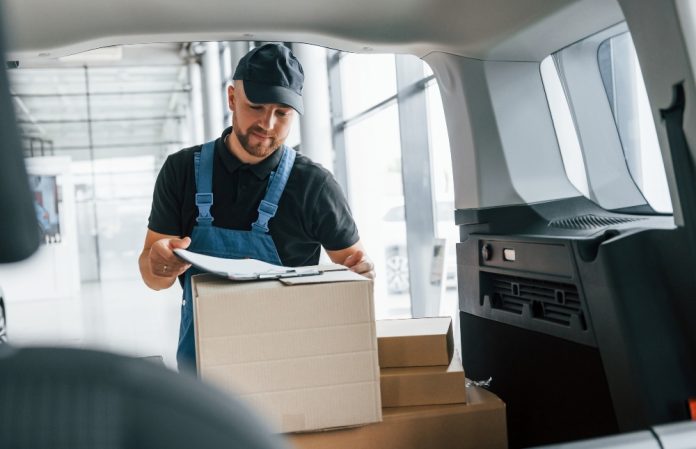Most of us shop online and take deliveries for granted, but how can we protect ourselves from delivery scams this year?
In a time dominated by online shopping, the risk of falling for a fake delivery scheme becomes more apparent. The ease of receiving goods at our homes is not without its dangers, especially considering the ongoing evolution of deceptive strategies by scammers.
A significant danger involves the potential compromise of credit card information, such as a credit card data breach, posing a risky situation with widespread consequences for unsuspecting individuals. To understand the complex world of online transactions and strengthen defences against delivery scams, a deep understanding of their methods and a commitment to staying informed becomes crucial.
Understanding the Anatomy of Delivery Scams
Beware of delivery scams, which can take different forms and often prey on individuals expecting packages.
Some scammers pose as trustworthy delivery services, sending fraudulent emails or messages claiming problems with the delivery that demand immediate attention. These messages may include harmful links or seek sensitive information, putting you at risk of credit card data exposure or identity theft.
In other instances, fake delivery personnel may show up at your doorstep, claiming additional fees or requesting payment for a package that doesn’t exist. Victims caught off guard may end up providing credit card details or making payments to these impostors.
Real-life Stories – Unmasking the Scam
Recent news stories serve as a level of caution, highlighting the ingenuity of scammers. One individual received an email claiming a failed delivery attempt, urging them to click a link for redelivery options. Unbeknownst to them, it was a phishing attempt leading to a credit card data breach. Another fell victim to a fake delivery person who convinced them of an outstanding fee, extracting payment and disappearing with the funds.
Protecting Yourself – Tips to Avoid Falling Victim to a Delivery Scam
1. Verify Delivery Notifications
Cross-verifying delivery notifications is crucial in safeguarding against scams. Legitimate delivery services furnish tracking numbers and detailed delivery status information.
Exercise caution when faced with unsolicited messages, particularly those urging urgent actions or payments. Stay vigilant to ensure a secure and hassle-free online shopping experience.
2. Check for Official Communication Channels
In instances of doubt, it’s prudent to utilise official communication channels for verification. Reach out directly to the delivery service using their official website or customer service number to confirm any discrepancies.
Don’t just trust contact details from suspicious emails or messages, as scammers often manipulate these channels. Double-checking through official means adds an extra layer of security, making sure you’re directly in touch with the authentic service and avoiding potential scams.
3. Validate Delivery Personnel
Prioritise your safety by validating the identity of delivery personnel, especially for in-person deliveries. Request official identification from the individuals handling the delivery. Legitimate carriers and delivery services equip their personnel with official identification, providing a reliable means of verification. It’s essential to establish trust before making any payments or engaging further.
By taking this precautionary step, you add an additional layer of security to your transaction, ensuring that you only proceed with deliveries from authorised and reputable sources. This simple yet effective practice helps safeguard against potential scams involving fake delivery personnel.
4. Use Reputable Online Marketplaces
Stick to well-known and reputable online marketplaces. These platforms often have robust security measures in place to protect users from scams. Avoid making purchases from unfamiliar websites, especially if the deals seem too good to be true.
Seeking Help After a Scam
If you think you’ve been scammed during a delivery, act promptly. If you suspect your credit card information is compromised or notice unauthorised transactions, reach out to your bank or credit card provider right away. Report the problem and seek their help to secure your accounts and launch an investigation.
In addition to financial institutions, there are many different platforms available to help support your search for assistance while consumer protection agencies are valuable resources. They provide guidance on reporting scams and offer support to victims, contributing to the collective effort to combat online fraud.
Avoiding Delivery Scams One Step at a Time
As we explore the ever-expanding digital space, staying vigilant is our first line of defence against delivery scams. By understanding their tactics, verifying communications, and utilising reputable platforms, we can collectively contribute to a safer online shopping experience.
In case of suspicion or victimisation, prompt action and seeking assistance from relevant authorities can mitigate potential damages. Stay informed, stay cautious, and let’s build a resilient shield against the evolving strategies of scammers in 2024.



 Bitcoin
Bitcoin  Ethereum
Ethereum  Tether
Tether  XRP
XRP  Solana
Solana  USDC
USDC  TRON
TRON  Cardano
Cardano  Lido Staked Ether
Lido Staked Ether  Avalanche
Avalanche  Toncoin
Toncoin